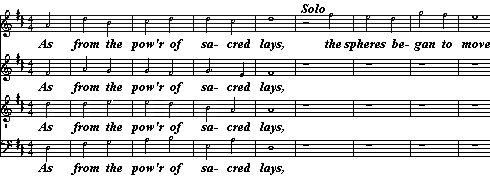 Ode pour le jour de la fête de Ste. Cécile
Ode pour le jour de la fête de Ste. Cécile
| DRAMATIS PERSONAE |
| Soprano, solo |
| Tenore, solo |
| Coro: SATB |
| Libreto: | John Dryden |
| Música terminada en: | 24 de septiembre de 1739 |
| Estreno: | 22 de noviembre de 1739 |
| Instrumentación: | Flauta traversa - Oboes I y II - Fagot - Trompetas I y II Timbales - Violín I y II - Viola - Violonchelo - Contrabajo - Laúd - Órgano |
| N°1 Obertura |
|---|
 |
 |
 |
| N°2 Recitativo Tenore | |
|---|---|
 | |
|
From Harmony, from heav'nly Harmony, This universal frame began. |
De la armonía, desde la celestial armonía, este cuadro universal comenzó. |
| N°3 Accompagnato Tenore | |
|---|---|
 | |
|
When Nature underneath a heap 0f jarring atoms lay, and could not heave her head; the tuneful voice was heard from high, "Arise! ye more than dead": then cold and hot, and moist and dry, in order to their stations leap, and Music's pow'r obey. |
Cuando la naturaleza se extendía bajo una pila de átomos discordantes y no podía levantar su cabeza; la armoniosa voz fue oída desde lo alto, «Levantaos, vosotros, que estáis más que muertos»: Entonces, el hielo y el calor, la humedad y lo seco, brotaron para tomar sus lugares, obedeciendo el poder de la música. |
| N°4 Coro | |
|---|---|
 | |
|
From Harmony, from heav'nly Harmony, this universal frame began: through all the compass of the notes it ran, the diapason closing full in Man. |
De la armonía, desde la celestial armonía, este cuadro universal comenzó, fluyó por todo el ámbito de notas, y se cerró el diapasón, completamente en el ser humano. |
| N°5 Aria Soprano | |
|---|---|
 | |
|
What passion cannot Music raise and quell! When Jubal struck the chorded shell, his list'ning brethren stood around , and, wond'ring, an their faces fell, to worship that celestial sound.
Less than a God they thought |
¿Existe pasión que la música no pueda provocar o calmar? Cuando Jubal tocó la caparazón con cuerdas, sus hermanos que escuchaban le rodearon, y asombrados cayeron sobre sus rostros para alabar aquel sonido celestial.
Ellos creyeron |
| N°6 Aria Tenore & Coro | |
|---|---|
 | |
 | |
|
The trumpet's loud clangour excites us to arms with shrill notes of anger, and mortal alarms.
The double, double, double beat |
El fuerte estruendo de la trompeta nos llama a luchar, con notas estridentes de rabia y alarmas de mortandad.
El redoble del estruendoso tambor |
| N°7 La Marche | |
|---|---|
 | |
| N°8 Aria Soprano | |
|---|---|
 | |
|
The soft complaining flute In dying notes discovers the woes of hopeless lovers, whose dirge is whisper'd by the warbling lute. |
La flauta de suave lamento en agonizantes notas descubre las aflicciones de los enamorados desesperanzados, cuyo canto fúnebre es susurrado por el trinar del laúd. |
| N°9 Aria Tenore | |
|---|---|
 | |
|
Sharp violins proclaim, their jealous pangs and desperation, fury, frantic indignation, depth of pains, and height of passion, for the fair disdainful dame. |
Los ásperos violines proclaman, sus dolores de celo y deseperación, furia, indignación desesperada, dolores profundos y pasión elevada, por la hermosa, dama desdeñosa. |
| N°10 Aria Soprano | |
|---|---|
 | |
|
But oh! what art can teach, what human voice can reach the sacred Organ's praise!
Notes inspiring holy love, |
Pero, ¡oh! ¿qué arte puede enseñar, qué voz humana puede alcanzar la alabanza del órgano sagrado?
Notas que inspiran amor santo, |
| N°11 Aria Soprano | |
|---|---|
 | |
|
Orpheus could lead the savage race; and trees uprooted left their place, sequacious of the lyre. |
Orfeo podía conducir la carrera salvaje; y los árboles se desraizaban dejando su lugar, seguidores de la lira. |
| N°12 Accompagnato Soprano | |
|---|---|
 | |
|
But bright Cecilia rais'd the wonder high'r: when to her Organ vocal breath was giv'n, an angel heard, and straight appear'd, mistaking earth for heaven. |
Mas la resplandeciente Cecilia provocó un milagro mayor: Cuando a su órgano se le dio el respiro de la voz, un ángel oyó, y apareció de pie, equivocándose creyó que la tierra era el cielo. |
| N°13 Coro | |
|---|---|
 | |
 | |
|
As from the pow'r of sacred lays the spheres began to move; and sung the great Creator's praise to all the bless'd above:
So when the last and dreadful hour, |
A partir del poder de los niveles sagrados, las órbitas comenzaron a moverse; y por todos los benditos del cielo: fue cantada la alabanza al Gran Creador,
Entonces, cuando la hora final y terrible, |
Copyright © 2000, translation by Osvaldo Castro


 Oratorios
Oratorios